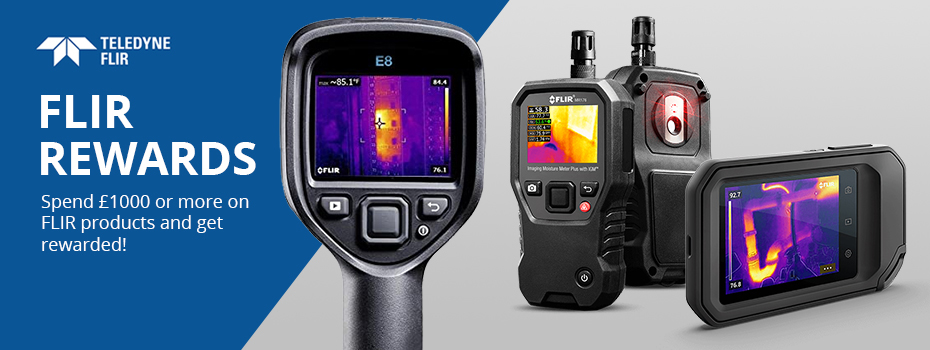 When you spend £1000 or more on qualifying Teledyne FLIR products between the 1st July and 31st December 2023, you’ll receive a FREE Teledyne FLIR tool of your choice (UK & EU customers only, T&Cs apply).
Continue reading →
When you spend £1000 or more on qualifying Teledyne FLIR products between the 1st July and 31st December 2023, you’ll receive a FREE Teledyne FLIR tool of your choice (UK & EU customers only, T&Cs apply).
Continue reading →Teledyne FLIR
-
Teledyne FLIR Rewards: Buy a FLIR Get a FREE FLIR
 When you spend £1000 or more on qualifying Teledyne FLIR products between the 1st July and 31st December 2023, you’ll receive a FREE Teledyne FLIR tool of your choice (UK & EU customers only, T&Cs apply).
Continue reading →
When you spend £1000 or more on qualifying Teledyne FLIR products between the 1st July and 31st December 2023, you’ll receive a FREE Teledyne FLIR tool of your choice (UK & EU customers only, T&Cs apply).
Continue reading → -
Bee Removal: 5 Things You Need to Know About Using Thermal Imaging for Pest Control
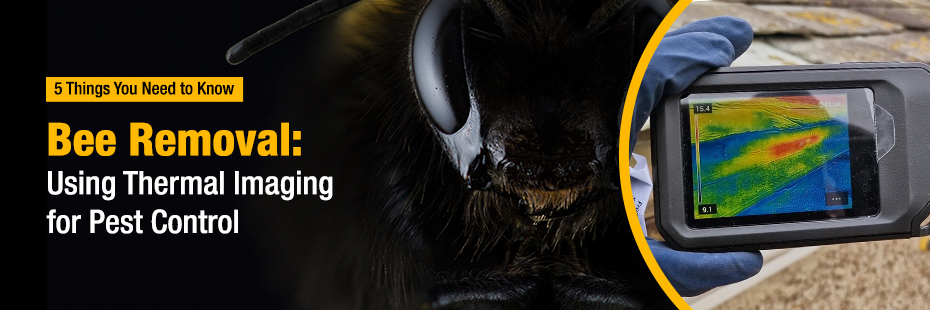 You know, as a pest control specialist, that bee, rodent, or insect removal can be time-consuming, invasive, and expensive. We know this too. However, we also know about an innovative solution... thermal imaging. Thermal imaging cameras, such as the handheld Teledyne FLIR C5, quickly detect the heat emitted by pests. This means you can precisely pinpoint nest locations. Consequently, targeting extraction methods become much simpler, which in turn limits damage, saves time, and reduces costs.
Continue reading →
You know, as a pest control specialist, that bee, rodent, or insect removal can be time-consuming, invasive, and expensive. We know this too. However, we also know about an innovative solution... thermal imaging. Thermal imaging cameras, such as the handheld Teledyne FLIR C5, quickly detect the heat emitted by pests. This means you can precisely pinpoint nest locations. Consequently, targeting extraction methods become much simpler, which in turn limits damage, saves time, and reduces costs.
Continue reading → -
Teledyne FLIR A-Series Automation Thermal Cameras Case Study: Electrical & Mechanical Installations
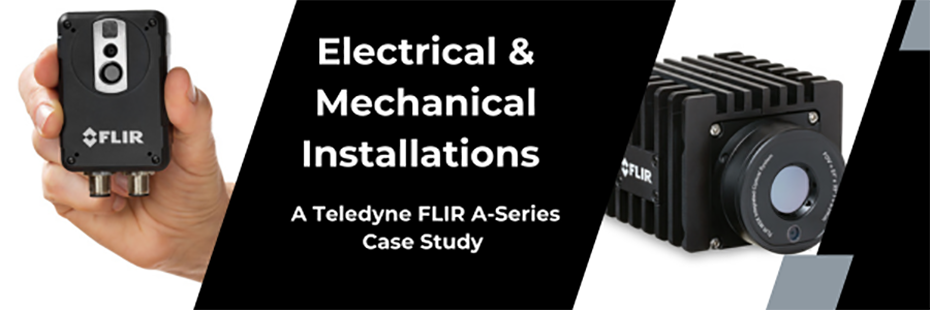 Combining FLIR’s state-of-the-art thermal imaging with Teledyne’s innovative machine vision technology, Teledyne FLIR has developed an array of sophisticated yet simple-to-use thermal imaging automation cameras. Teledyne FLIR’s A-series ranges from compact entry models, like the AX8, to sophisticated imagers suitable for use in hazardous areas, for example, the A310 Ex, and includes configurable cameras with a selection of lenses, such as the A50, A70, A400, A500, and A700. Ideal for when precision and control are mission critical, Teledyne FLIR’s A-series Automation Thermal Cameras are suitable for process control and quality assurance, early fire detection, and condition monitoring of electrical and mechanical installations.
Continue reading →
Combining FLIR’s state-of-the-art thermal imaging with Teledyne’s innovative machine vision technology, Teledyne FLIR has developed an array of sophisticated yet simple-to-use thermal imaging automation cameras. Teledyne FLIR’s A-series ranges from compact entry models, like the AX8, to sophisticated imagers suitable for use in hazardous areas, for example, the A310 Ex, and includes configurable cameras with a selection of lenses, such as the A50, A70, A400, A500, and A700. Ideal for when precision and control are mission critical, Teledyne FLIR’s A-series Automation Thermal Cameras are suitable for process control and quality assurance, early fire detection, and condition monitoring of electrical and mechanical installations.
Continue reading → -
PASS Ltd Becomes UK Authorised Distributor for Teledyne FLIR Axxx Automation Thermal Cameras
 Sales Manager at PASS Ltd, David Atkins, recently returned from a trip to Teledyne FLIR’s factory in Täby, Sweden where he met with Jonas Bolinder, Teledyne FLIR’s Northern Europe Sales Manager for R&D, Science, and Automation cameras, and “lovely chap” (as described by David). The purpose of the trip was to discuss Teledyne FLIR’s automated thermal camera series, the Axxx range. We caught up with David on his return.
Continue reading →
Sales Manager at PASS Ltd, David Atkins, recently returned from a trip to Teledyne FLIR’s factory in Täby, Sweden where he met with Jonas Bolinder, Teledyne FLIR’s Northern Europe Sales Manager for R&D, Science, and Automation cameras, and “lovely chap” (as described by David). The purpose of the trip was to discuss Teledyne FLIR’s automated thermal camera series, the Axxx range. We caught up with David on his return.
Continue reading → -
6 Things to Consider Before Buying an Acoustic Camera
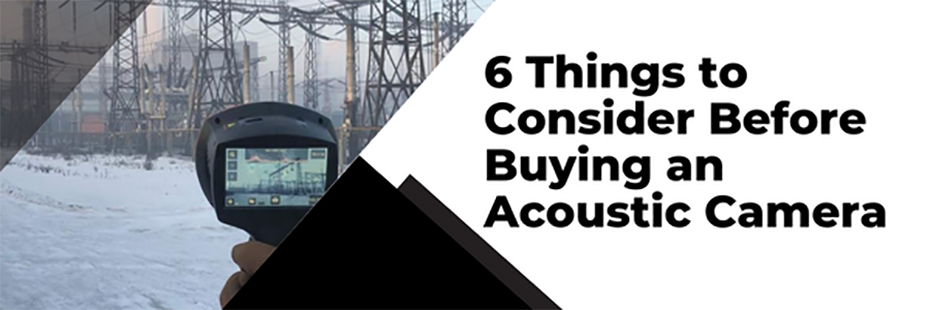 Acoustic imaging cameras, otherwise known as sonic or ultrasonic imagers, are popular amongst facilities managers, especially those working in industrial or high-voltage settings. They are extremely easy to use and highly effective at finding air/pressurised leaks and partial discharge/corona. Acoustic cameras detect audible and/or ultrasonic sound; convert it into a sound map; then superimpose this map onto a digital image of the inspection area, allowing you to pinpoint the source of the leak or electrical fault accurately, simply, and quickly. As sonic imaging is a relatively new preventative maintenance/inspection technology, it can be difficult to know what makes a good acoustic camera. Thankfully, Teledyne FLIR has outlined six things to look for when purchasing an ultrasonic imager.
Continue reading →
Acoustic imaging cameras, otherwise known as sonic or ultrasonic imagers, are popular amongst facilities managers, especially those working in industrial or high-voltage settings. They are extremely easy to use and highly effective at finding air/pressurised leaks and partial discharge/corona. Acoustic cameras detect audible and/or ultrasonic sound; convert it into a sound map; then superimpose this map onto a digital image of the inspection area, allowing you to pinpoint the source of the leak or electrical fault accurately, simply, and quickly. As sonic imaging is a relatively new preventative maintenance/inspection technology, it can be difficult to know what makes a good acoustic camera. Thankfully, Teledyne FLIR has outlined six things to look for when purchasing an ultrasonic imager.
Continue reading → -
Catch Cattle Lameness with Economical Thermal Cameras
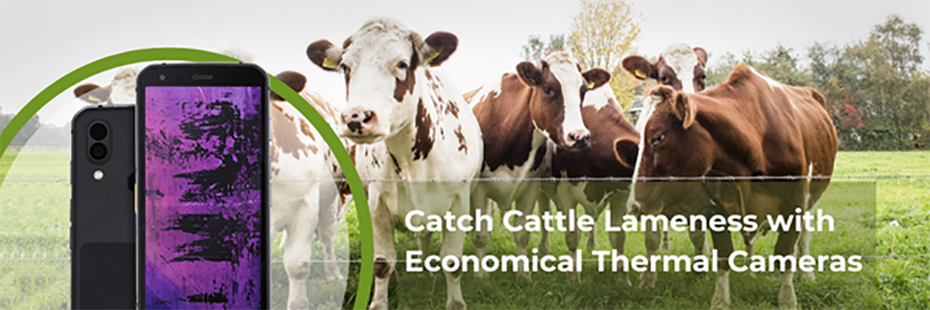 FarmingUK reports that lameness affects between 20% and 25% of cattle across the UK. Usually treated with expensive antibiotics, lameness costs the dairy industry approximately £53 million a year.[1] It has long been acknowledged that thermal imaging can provide an effective method of detecting lameness. Infections or inflammations are often the root cause of lameness and both conditions emit heat which can be picked up by a thermal imager. Catching lameness early and identifying its source means farmers can target their treatments more effectively. For example, lameness caused by an infection can be treated earlier with a shorter course of antibiotics, saving money; whereas lameness resulting from inflammation may be treated more effectively and economically with anti-inflammatories; by blocking the affected claw; or by keeping the cow on a soft surface until she has recovered. Until recently, farmers have been reluctant to invest in thermal imaging as it was thought that only high-end, very expensive models were sophisticated enough to reveal lameness. However, a recent study by Aidan Coe of the Royal Veterinary College (RVC) has discovered that less costly thermal imaging models are just as suitable for recognising lameness in cattle, potentially offering farmers significant savings while also improving the welfare of cows.
Continue reading →
FarmingUK reports that lameness affects between 20% and 25% of cattle across the UK. Usually treated with expensive antibiotics, lameness costs the dairy industry approximately £53 million a year.[1] It has long been acknowledged that thermal imaging can provide an effective method of detecting lameness. Infections or inflammations are often the root cause of lameness and both conditions emit heat which can be picked up by a thermal imager. Catching lameness early and identifying its source means farmers can target their treatments more effectively. For example, lameness caused by an infection can be treated earlier with a shorter course of antibiotics, saving money; whereas lameness resulting from inflammation may be treated more effectively and economically with anti-inflammatories; by blocking the affected claw; or by keeping the cow on a soft surface until she has recovered. Until recently, farmers have been reluctant to invest in thermal imaging as it was thought that only high-end, very expensive models were sophisticated enough to reveal lameness. However, a recent study by Aidan Coe of the Royal Veterinary College (RVC) has discovered that less costly thermal imaging models are just as suitable for recognising lameness in cattle, potentially offering farmers significant savings while also improving the welfare of cows.
Continue reading → -
PASS Proudly Provides FLIR Thermal Cameras for Octopus Energy Home Efficiency Surveys
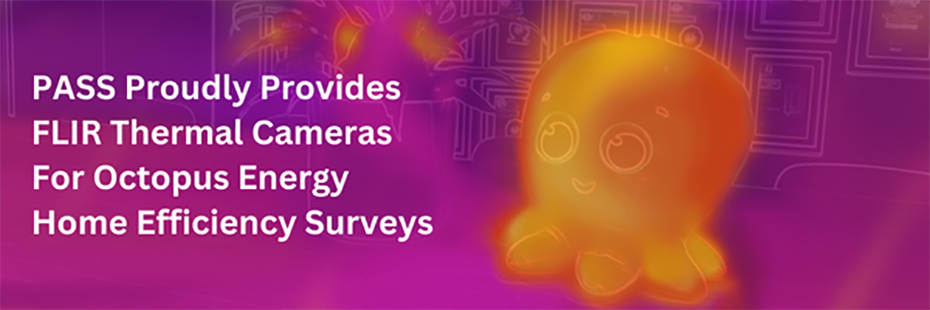 It is no secret that the cost-of-living crisis, rising global temperatures, and approaching climate targets have created more pressure than ever to reduce our energy consumption. For over a year, we have published multiple reports on councils, charities, and utility companies harnessing thermal imaging to identify sources of heat loss around homes, in a bid to reduce both energy bills and carbon emissions. We are very pleased and proud to reveal that we have played a significant role in one of these stories: that of Octopus Energy lending Teledyne FLIR Thermal Cameras to its customers as part of its Octo Assist customer support initiative. As Teledyne FLIR’s number one UK supplier, we initially provided three-hundred Teledyne FLIR One Pro Thermal Smartphone Attachments for Octopus Energy’s thermal camera loan program. Now, thanks to the popularity of the project, we have had the privilege of supplying a further one hundred and seventy new Teledyne FLIR One Edge Pro Thermal Smartphone Attachments. We are delighted to know that these cameras will go towards helping Octopus Energy’s customers lower their energy consumption, emissions, and expenditure.
Continue reading →
It is no secret that the cost-of-living crisis, rising global temperatures, and approaching climate targets have created more pressure than ever to reduce our energy consumption. For over a year, we have published multiple reports on councils, charities, and utility companies harnessing thermal imaging to identify sources of heat loss around homes, in a bid to reduce both energy bills and carbon emissions. We are very pleased and proud to reveal that we have played a significant role in one of these stories: that of Octopus Energy lending Teledyne FLIR Thermal Cameras to its customers as part of its Octo Assist customer support initiative. As Teledyne FLIR’s number one UK supplier, we initially provided three-hundred Teledyne FLIR One Pro Thermal Smartphone Attachments for Octopus Energy’s thermal camera loan program. Now, thanks to the popularity of the project, we have had the privilege of supplying a further one hundred and seventy new Teledyne FLIR One Edge Pro Thermal Smartphone Attachments. We are delighted to know that these cameras will go towards helping Octopus Energy’s customers lower their energy consumption, emissions, and expenditure.
Continue reading → -
PASS Provides FLIR Thermal Camera for Poultry Farmer’s Enlightening Barn Ventilation Report
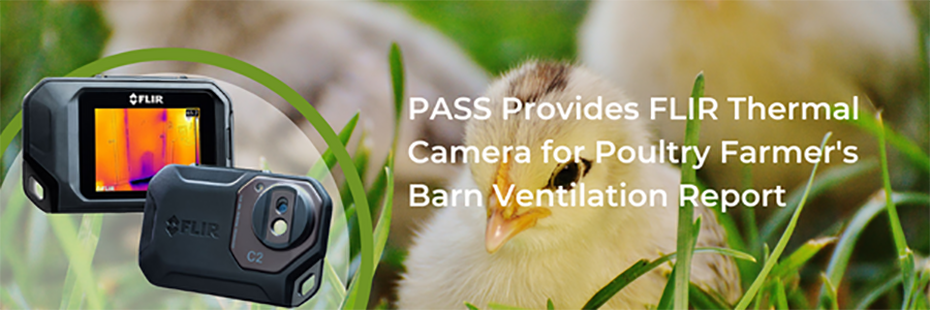 In 2016, PASS Ltd provided Devonshire-based beef and poultry farmer and recipient of Tesco’s Future Farmer Foundation Scholarship, Christina Hutchings, with a FLIR C2 Thermal Imaging Camera for her research into understanding ventilation to improve litter conditions in broiler houses. Now, that highly anticipated report, titled Where does all the water go? How a better understanding of ventilation can be used to improve litter conditions in broiler houses, has been published. In addition to detailing her in-depth investigations which Hutchings draws on to make several suggestions on improving barn ventilation, the report illustrates the critical role thermal imaging can play in farming.
Continue reading →
In 2016, PASS Ltd provided Devonshire-based beef and poultry farmer and recipient of Tesco’s Future Farmer Foundation Scholarship, Christina Hutchings, with a FLIR C2 Thermal Imaging Camera for her research into understanding ventilation to improve litter conditions in broiler houses. Now, that highly anticipated report, titled Where does all the water go? How a better understanding of ventilation can be used to improve litter conditions in broiler houses, has been published. In addition to detailing her in-depth investigations which Hutchings draws on to make several suggestions on improving barn ventilation, the report illustrates the critical role thermal imaging can play in farming.
Continue reading →


